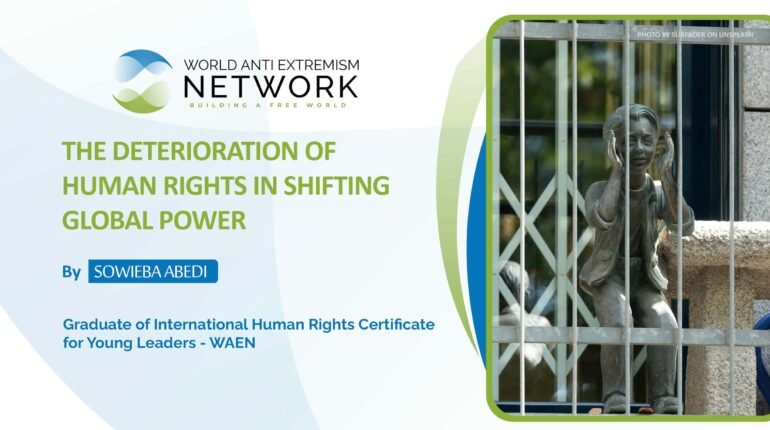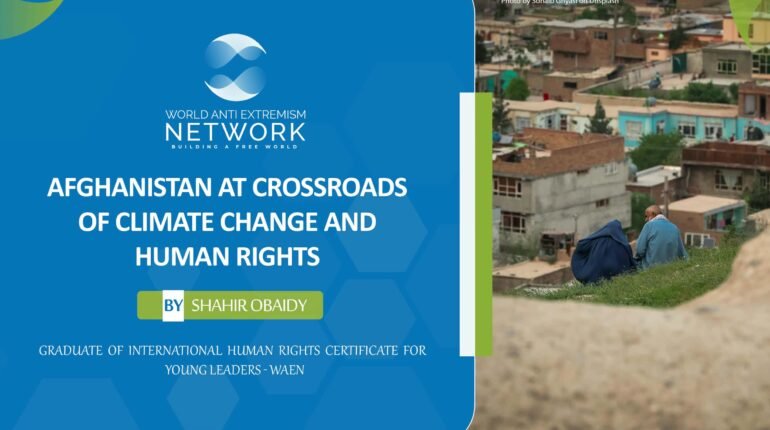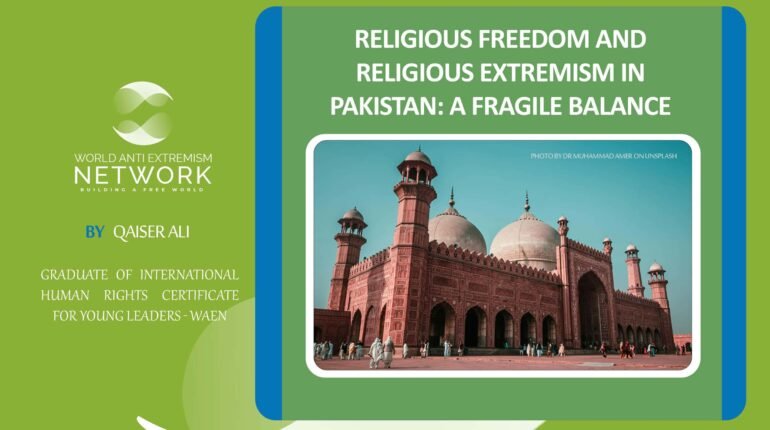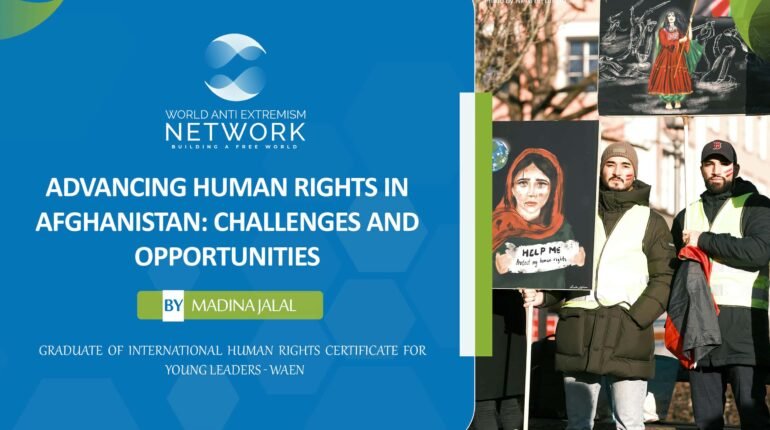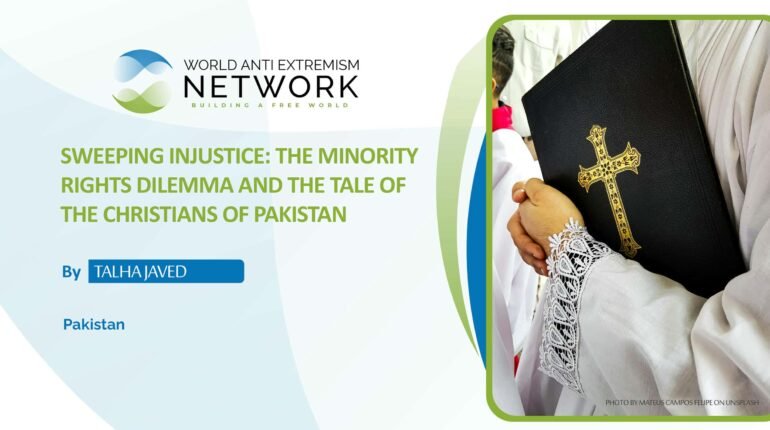Advancing Human Rights in Afghanistan: Challenges and Opportunities
- World Anti Extremism Network
- Advancing Human Rights in Afghanistan: Challenges and Opportunities
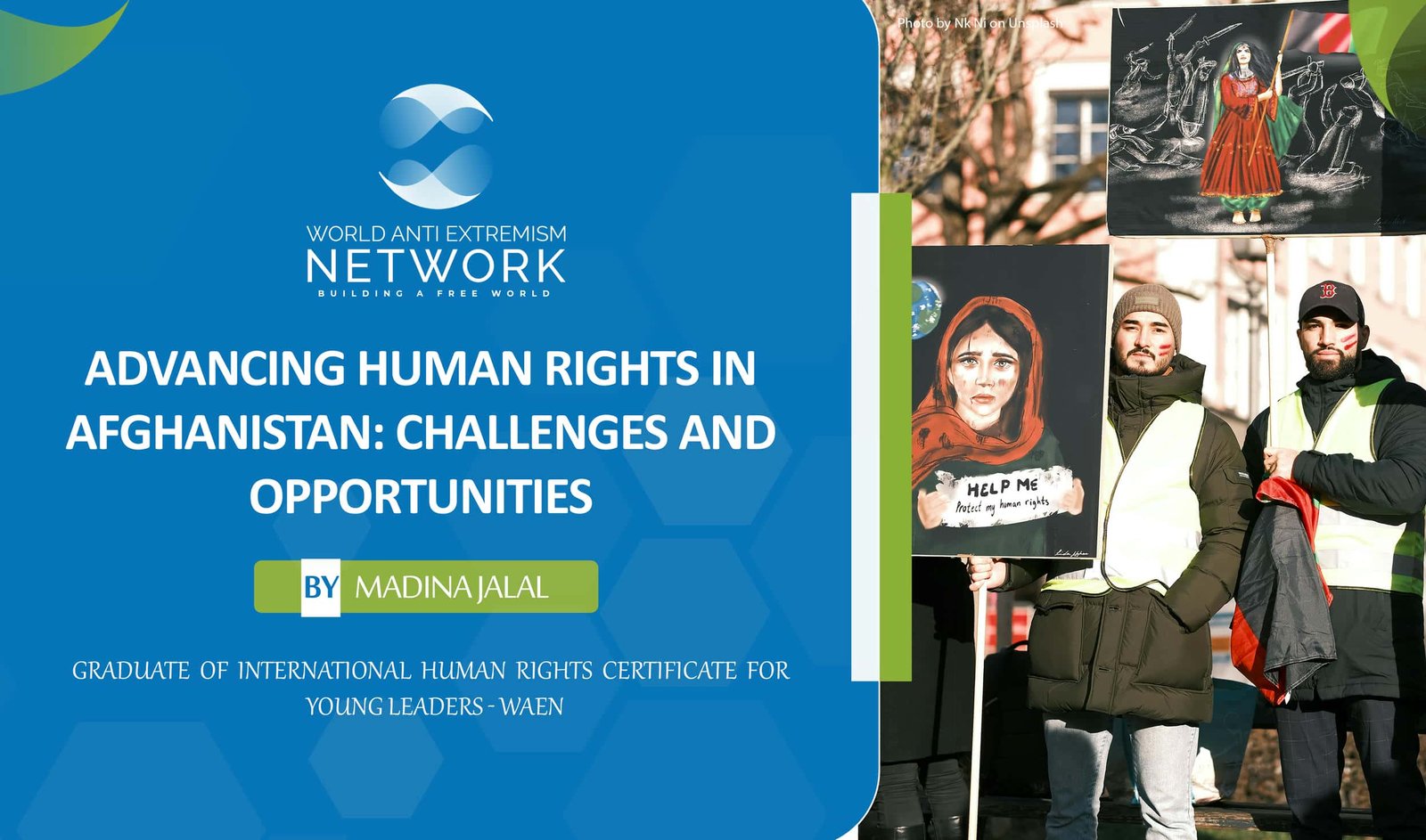
- Advancing Human Rights in Afghanistan Challenges and Opportunities
- By Madina Jalal
- June 19, 2025
Share on:
Introduction
Any society that wants to promote peace, stability, and development should prefer human rights protection and progress. In Afghanistan, the human rights situation has faced unprecedented challenges, especially after the Taliban regained control of the government in August 2021 (United Nations, 2021). This article addresses the status of human rights in Afghanistan, focusing on major concerns, persistent challenges, and potential avenues for progress.
A 2015 study by the Afghanistan Research and Evaluation Unit (AREU), The Political Economy of Education and Health Service Delivery in Afghanistan, based on field research in the provinces of Wardak, Badghis, and Balkh, analyzed service delivery as a resource in local political power struggles. These local dynamics are embedded within broader national contests for power. Among the outcomes are sectoral bargains, defined as “specific strategic interactions of actors and their interests within the education sector”, and local political settlements at the district and district-cluster levels. The primary accounts in this report highlight the critical role of local centers of influence, particularly elders and religious leaders (ulama), often as members of School Management Councils (SMCs) or shuras, in negotiating and enforcing these local political settlements over education.
Societal Impact
The abuse of human rights in Afghanistan has had a deep and complex impact, particularly on women and girls, who face widespread discrimination and violence. Following the return of the Taliban, girls’ schools have been shut down across the country, depriving them of their right to education. The denial of this right affects not only their immediate opportunities but also the future of an entire generation. For girls, being unable to attend school not only increases the risk of poverty but also causes Afghanistan to suffer socially and economically. With fewer chances to pursue education and careers, many girls who once dreamed of becoming doctors, engineers, or other professionals have lost hope, contributing to growing despair about the country’s future.
In addition to their studies, girls also took on household and outside responsibilities, much like other family members. Families often relied on sons returning from university during holidays to help support household expenses.
Furthermore, freedom of speech has significantly declined. Journalists, activists, and ordinary citizens now face severe consequences if they attempt to speak out or report violations. The Taliban suppress criticism and public discourse through violence, intimidation, and imprisonment. This atmosphere of fear makes it nearly impossible for people to voice concerns or work collectively to address societal problems. The media landscape has become increasingly hostile to independent journalism, with self-censorship becoming the norm.
Global Perspectives
Afghanistan has at the same time been at the center of global dynamics and resolutely separated from them. These intersections were put into stark relief in 2001 when Afghanistan became the center of the world’s attention following the attacks on the World Trade Center, the U.S. invasion of Afghanistan, and the attempt to uproot the Taliban. Then, over twenty years later, Afghanistan took center stage again when the American withdrawal in August 2021 sent the nation reeling into chaos, and the world witnessed the Taliban takeover and the ensuing humanitarian crisis. These events, though, are part of a much longer history where Afghanistan has been at the center of geopolitical tensions. However, the reactions of different countries have been inconsistent and often shaped by geopolitical interests. Some nations prioritize fiscal concerns and regional stability over the advocacy of human rights, leading to a fragmented international response.
It is important for the international community to maintain pressure on the Taliban rule, as well as support those who tirelessly work to uphold human rights in Afghanistan. Engaging in multilateral discussions focused on human rights can help shape a more favorable environment for progress. In addition, humanitarian aid plays an important role in reducing the immediate suffering of the Afghan population. While this assistance is crucial, it should be paired with strong advocacy for human rights. Efforts to document abuses, support local organizations, and strengthen Afghan civil society are key components of a comprehensive international response.
Personal Stories
Individual stories of victims of human rights violations in Afghanistan offer poignant and inspiring glimpses into the harsh realities faced by many. Take, for example, the case of a young girl named Tayeba, who showed great aptitude and dreamed of becoming a doctor. That dream was crushed when her school was shut down. Now confined to her home, Tayeba feels stuck and disheartened. Her aspirations, shared by countless other girls, have been extinguished by a regime that views education for women as a threat.
Yet, amid these stories of despair, tales of resilience and courage emerge. Many women have organized underground schools, defying Taliban orders to secretly educate young girls. These secret efforts reflect a deep commitment to education and empowerment, showcasing the innovative ways Afghan women are navigating oppressive conditions. Activists continue to speak out, often at great personal risk, working to document abuses and rally support both locally and internationally. These stories highlight the resilience of the human spirit and the unrelenting pursuit of freedom and equality.
Consider the story of Hawa, a grassroots activist who has risked her life to fight for women’s rights. She holds confidential gatherings to address issues affecting women and to share information about available resources. In Afghanistan, bravery has become a quiet yet powerful movement that continues to push for justice and equality in the face of overwhelming challenges.
Call for action
The international community should take a stand in support of human rights in Afghanistan. Many actionable steps can be taken here:
- Advocates for human rights: Increase awareness about the situation in Afghanistan through social media, community programs, and educational initiatives. Involving others can create a ripple effect, amplifying the call for change. Campaigns that focus on storytelling and personal experiences can humanize the issue and encourage broad public engagement.
- Support local organizations: Donate to NGOs working to protect human rights in Afghanistan or to local volunteers. These organizations are often on the front lines, providing essential support and resources to those in need. Supporting local groups not only strengthens Afghan civil society but also helps ensure that aid meets the specific needs of the communities.
- Lobby for policy changes: Engage with policymakers to ensure that human rights are central to foreign policy decisions regarding Afghanistan. Apply pressure to prioritize human rights in diplomatic discussions and actions. Advocating for the inclusion of human rights conditions in international support agreements can help ensure that aid is aligned with the protection of fundamental rights.
- Documents and Share Stories: Collect and share personal stories from people affected by human rights violations. Documentation of these experiences can help in making the issue human and evoke sympathy and action. Efforts to preserve these narratives are necessary to understand the effect of harassment and promote a sense of global responsibility.
- Promoting education: Support young people in Afghanistan, especially the educational initiatives to empower girls.
Conclusion
The condition of human rights in Afghanistan is related to complex and depth, marked by the history of conflict and the recent revival of oppressive rule. The challenges faced by women, minorities, and the broader population outline the immediate requirement for a collective global response. Their own stories of suffering and resilience bring to existence the human element of these violations and remind us of the tenacity and courage of the people fighting for our rights. It is up to the global community to urge change and be on the side of the Afghan people. By raising awareness, promoting education, and providing assistance to local organizations, we can help raise the voices of those who have been silenced. Call to action is clear: We should stand in solidarity with the Afghan people, to hold the authorities accountable and ensure that the principles of human rights are retained.
Finally, the human rights fight in Afghanistan is not just about the present; this is about achieving a more just future for generations to come. Together, we can contribute to a world where every person enjoys rights and freedoms for all humanity. Through collective action and unbreakable commitment, we can help promote an environment where human dignity is respected and preserved, paving the way for a bright future for Afghanistan. The journey towards justice and equality is long, but with perseverance and global solidarity, it is worth a visit.
About the Author
Madina Jalal is one of the graduates of the International Human Rights Certificate Program, a dedicated human rights advocate from Kabul, Afghanistan. She holds a Bachelor’s degree from Kabul University and currently serves as a Communication Assistant at a non-governmental organization (NGO). In this role, she is committed to amplifying the voices of marginalized communities, particularly women and girls, and promoting a culture of justice and equality. Madina was selected as a Champion in the Million Leaders Asia Fellowship, where she honed her leadership and project management skills. This experience deepened her resolve to create inclusive opportunities, especially for women and girls who are often excluded from decision-making spaces in Afghanistan. Previously, she served as a Human Resource Squad Leader at an international company. Her advocacy and professional journey are driven by a strong belief in the resilience of the Afghan people and their ongoing struggle for fundamental human rights. Madina is deeply passionate about contributing to a more equitable and just society for all.
The opinions expressed in these articles are solely those of the authors and do not reflect the views or positions of the organization. If you find any information incorrect, please contact (research@worldantiextremism.org), and we would be happy to assist you. You can download, distribute, and reuse this work, provided you credit the author and cite the original source.
Related Articles
Subscribe to our newsletter and stay updated.
Contact
Toronto, Ontario, M1L 0E5 Canada
Subscribe to our newsletter and stay updated.
Contact
Toronto, Ontario, M1L 0E5 Canada
Subscribe to our newsletter and stay updated.
Contact
Toronto, Ontario, M1L 0E5 Canada


